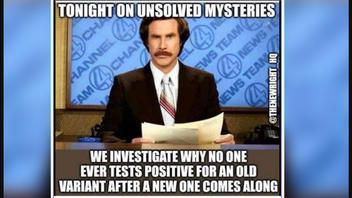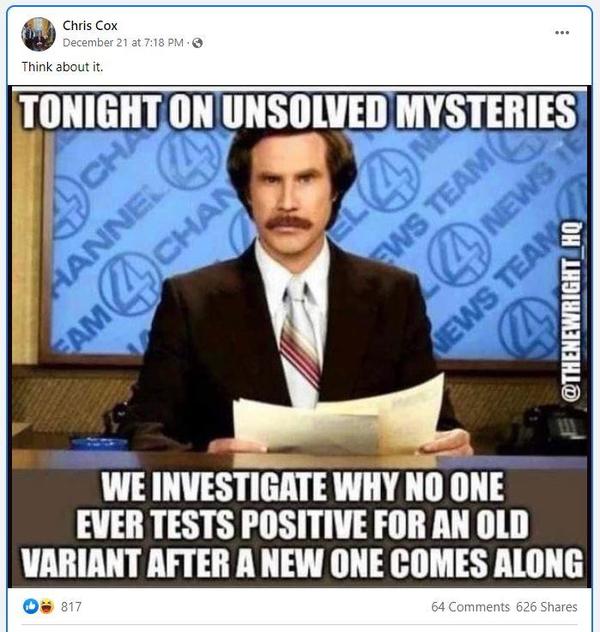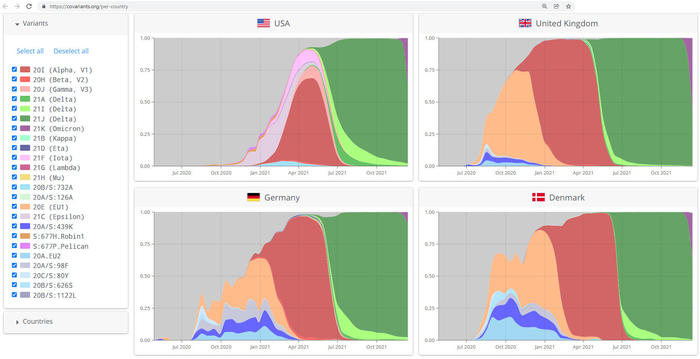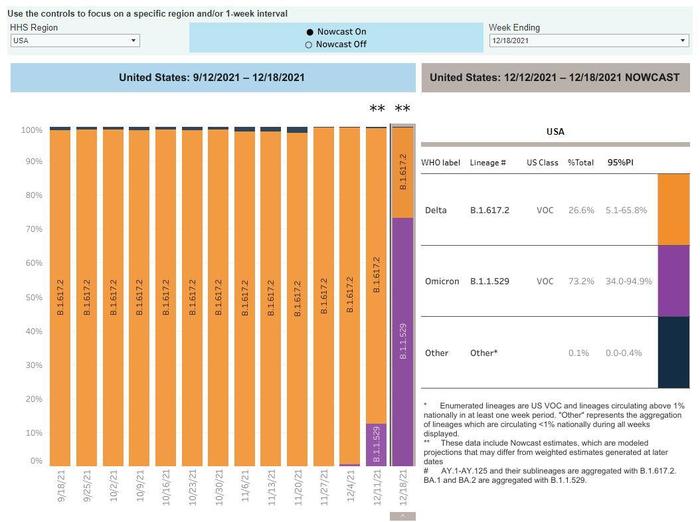
When a new variant is found to be spreading, does the old variant instantly disappear? Do people test positive for specific COVID-19 variants if they take a rapid antigen or a PCR test? No, neither of these assumptions are true: The initial testing for SARS-CoV-2 can only tell a person if they are infected or not. That test result does not have information about the specific variant. Samples that have tested positive may be sent to another lab for genomic sequencing to identify the specific variant, which can take more than a week.
This meme appears in a Facebook post on December 21, 2021. It was captioned, "Think about it." The text in the meme reads:
TONIGHT ON UNSOLVED MYSTERIES
WE INVESTIGATE WHY NO ONE EVER TESTS POSITIVE FOR AN OLD VARIANT AFTER A NEW ONE COMES ALONG
This is how the post appeared on Facebook at the time of writing:
(Image source: Facebook screenshot taken on Thu Dec 23 16:00:32 2021 UTC)
This meme hinges on the premise that COVID test results convey information about variants of the SARS-CoV-2 virus -- they don't. It also presents the idea that there is only one variant circulating at a time. This is also not the case. Graphs showing the timing and prevalence of specific variants in countries around the world can be viewed at covariants.org. Unlike charts that show the number of cases over time, these charts show what proportion of all the sequences analyzed in a country are composed of a specific variant. In the examples below, three variants of delta are shown with three shades of green and the emergence of omicron is visible as purple in the upper right corner of each nation's chart.
(Image source: covariants.org screenshot taken on Mon Dec 27 23:34:02 2021 UTC)The two common types of test available to the public are the polymerase chain reaction (PCR) test and the rapid antigen test. The PCR test is a molecular test that detects viral RNA and can take a day or more to produce a lab result. The "S-gene dropout" sets the omicron variant apart from the delta variant. A standard PCR test can detect a specimen that is unlikely to be delta, but genomic sequencing is still required to confirm if it is omicron. The rapid antigen test, which can be taken at home, detects certain proteins on the virus and can give results in a few minutes. Neither of these types of test is designed to give specific information about the virus variant, only if the person has a detectable active COVID infection. A third type of test is the antibody test, which detects if a person developed antibodies from an infection in the past.
Only a small portion of positive COVID test swabs are sent to a lab for further genomic sequencing. In the U.S. it can take two to three weeks for a positive test sample to be analyzed and the variant identified. This sequencing is not for personal diagnostics, but is a population-based surveillance measure. There is a lag between when a sample is collected and when the variant is identified. On the website of the Centers for Disease Control and Prevention (CDC) a chart called the "Nowcast" is updated weekly and shows an estimate of the proportion of the variants circulating "now" from specimens recently collected in different regions of the United States. These will not be definitively identified for several weeks.
The Nowcast chart below, for the week ending on December 18, 2021, shows in purple the omicron variant at 73.2% overtaking the delta variant in orange at 26.6% as the most prevalent variant of concern in the United States.
(Image source: cdc.gov screenshot taken on Mon Dec 27 18:36:05 2021 UTC)
The CDC explains why strain surveillance is an important public health measure, listing five ways that a new variant could impact public health:
- Ability to spread more quickly in people. There is already evidence that one mutation, D614G, confers increased ability to spread more quickly than the wild-type[2] SARS-CoV-2. In the laboratory, 614G variants propagate more quickly in human respiratory epithelial cells, outcompeting 614D viruses. There also is epidemiologic evidence that the 614G variant spreads more quickly than viruses without the mutation.
- Ability to cause either milder or more severe disease in people. In January 2021, experts in the UK reported that B.1.1.7 variant may be associated with an increased risk of death compared to other variants. More studies are needed to confirm this finding.
- Ability to evade detection by specific viral diagnostic tests. Most commercial reverse-transcription polymerase chain reaction (RT-PCR)-based tests have multiple targets to detect the virus, such that even if a mutation impacts one of the targets, the other RT-PCR targets will still work.
- Decreased susceptibility to therapeutic agents such as monoclonal antibodies.
- Ability to evade natural or vaccine-induced immunity. Both vaccination against and natural infection with SARS-CoV-2 produce a "polyclonal" response that targets several parts of the spike protein. The virus would likely need to accumulate multiple mutations in the spike protein to evade immunity induced by vaccines or by natural infection.




















